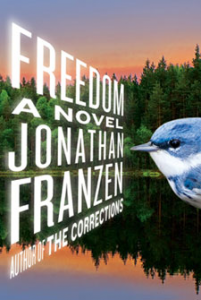
I had heard much about Freedom before I started reading it. Jonathan Franzen’s novel has received wide acclaim. In many ways it is like a rollercoaster ride: strap yourself in and hold on tight. It is witty and harsh, and the plot moves along at breakneck speed.
Franzen attacks a huge topic: the freedoms we enjoy in life, and their impact on others and ourselves.
He does this by examining in intimate detail the lives of a reasonably ordinary family: Walter Berglund, an environmentally-conscious guy, married to Patty, a stay-at-home Mum who used to be a basketball star, and their two children, the intelligent Jessica, and the rebellious Joey.
Walter is deeply in love with Patty, and has sacrificed some of the activist ideals of his youth to settle down to suburban life with her. Patty seems to have not quite got over the injury to her knee that ended a promising sporting career, and wonders if she’s missing out on other things in life. Jessica works hard and brings credit to her family, but seems to always be in the shadow of her brother. Joey seems sensitive to the frustrations and disappointments in his family and ends up breaking out at the tender age of 16, moving in next door with his girlfriend.
The story spirals into mess after mess, affairs and scandals, lies and betrayals, and the family is split apart.
The goal for Walter is to fulfil his activist ideals, but he has to compromise continually. For Patty, it is to test the sexual thrill she felt with Walter’s best friend. For Jessica, it is to try and hold the family together. For Joey, it is to live hard and fast and make lots of money.
In the end, all those goals are found to be fleeting and unfulfilling.
For me, there was a refreshingly Gospel-edged message that emerged from the book: sin has consequences. Society wants the freedom to have sex with people of choice, but doing that will hurt people, it will harden hearts and souls, it will split apart marriages. Society wants the freedom to consume as much as people want, but this inevitably has an impact on the economy and the environment, forcing us into impossible choices.
This book is not an easy read, but then the stories of our own lives laid bare are not easy either.
The book unmasks many aspects of daily living: the cruelty and gossip of neighbours, the sham of celebrity, our lip service to environmental concerns (we will speak out but not pay up or change our lives), the false promises of sport and rock music to add lasting significance and meaning to our lives, and the frailty of marriage and families.
Franzen is brutally honest:
Parents are programmed to want the best for their kids, regardless of what they get in return. That’s what love is supposed to be like, right? But in fact, if you think about it, that’s kind of a strange belief. Given what we know about the way people really are. Selfish and short-sighted and egotistical and needy.
There is also an examination of what it means to be a “good” person. In the end, all the “good” people are shown to be as vulnerable to hypocrisy and falls from grace, as the openly “bad” people. They all fall short.
Franzen includes conservative Christians (for their shallow political views) and the Catholic church (for its policies on birth control) in his firing sights, and his language is often crude. However, overall the book is intelligent and sharp, and (as a reviewer in the Independent on Sunday wrote) “Deeper, funnier, sadder and truer than a work of fiction has any right to be.”
There is a telling moment when Walter realises he seems impelled in directions in life that seem right, but sometimes end up going in the opposite direction… “There was no controlling narrative: he seemed to himself a purely reactive pinball in a game whose only object was to stay alive for staying alive’s sake.”
For Christians, the Gospel story provides a controlling narrative to our lives, a way of assessing freedoms and goodness and truth; a way of balancing the natural extremities of our desires and the brilliance of our self-justification.
KARA MARTIN is the Associate Dean of the Marketplace Institute, Ridley Melbourne, a lecturer with School of Christian Studies (www.socs.org.au), and Wesley Institute (www.wi.edu.au) and is an avid reader and book group attendee. Kara does book reviews for Hope 103.2’s Open House (www.theopenhouse.net.au).
Email This Story
Why not send this to a friend?
